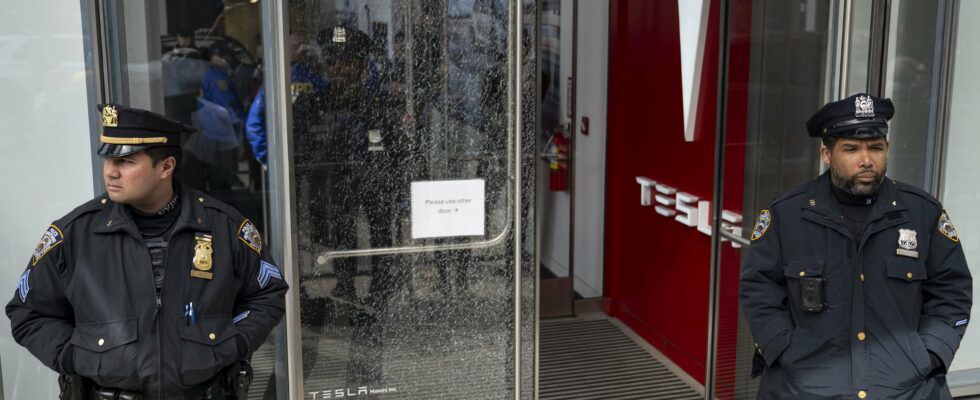“Boycott USA!” : The watchword has grown in recent weeks from Canada to Europe, in reaction to the foreign policy of American president Donald Trump. France is not to be outdone: barely two months after the billionaire inauguration, an Ifop survey commanded by the NYC tourist information site. FR reveals, this Wednesday, March 26, that the popularity rating of the United States with the French has been at its lowest in 40 years and that two out of three support the boycott of American brands. Unpublished fact: this phenomenon “would not be a transient emotional reaction”, and could last in time – transcending for the first time political and sociological cleavages.
The feeling of a cultural “gap” that deepens
Economic patriotism, disengagement to Ukraine, end of equality promotion programs, attacks on the scientific community: in a few weeks, the new administration seems to have managed to undermine the image of America and its businesses.
In France, the sympathy for the United States fell to 25 % – against 65 % in 2010, under the mandate of Barack Obama. A historically low level which has managed to go beyond the score under the George W. Bush administration (whose invasion of Iraq in 2003 caused dissensions within Franco-American relations).
This degradation of the image of America goes hand in hand with the growing feeling of a gap between French and American values, indicates the study: only a quarter of respondents (26 %) estimates that the two countries are “close”, against almost half about twenty years ago.
Transpartisan phenomenon
Currently, 62 % of French people support boycott calls for American companies that multiply everywhere, while one in three boycottes actually at least one of these brands. If the trend seems more pronounced in left-wing voters (72 % support), the boycott of American products also appeals to a large majority of voters in the center-right (65 %). Only voters of the national rally appear to be set back (only 49 % support).
“This boycott is fired by anti-trumping-62 % of boycotters explain their gesture by opposition to Trump’s policy-but also notes other motivations” such as economic patriotism on the right (support for French employment), or the defense of societal progressiveness on the left (questioning of the American consumption model, ecological sensitivity), explains the study.
The ambassador brands are the most targeted
Among the brands targeted by these boycotts, there are essential symbols of the American lifestyle. Coca-Cola (48 %) is today the most boycotted brand, in front of fast food brands: Macdonald (44 %), Starbucks (15 %) KFC (12 %).
The other targeted brands are those considered to be close to the administration, in particular those belonging to Elon Musk: Tesla (19 %) and X (10 %). Data that corroborates the fall in sales of Tesla cars in Europe (minus 45 % in January 2025 compared to the previous year), at the same time where the electric cars market is, on the contrary, growing.
“All American sectors are potentially affected by this boycott, but with intensities that depend mainly on two factors: the American visibility of the brand and the existence of credible alternatives”, explains Ifop, as in food or automobile, for example. European or Asian cars will be able to easily replace American models. On the other hand, we cannot say so much social networks: “The French are much less motivated at the idea of abandoning their habits with the American giants of new technologies, to which they are often very dependent”.
A trend that could last
Unpublished fact raised by Ifop: this boycott movement affects large sociological categories, which could make it lasting. Unlike traditional boycott movements, “often worn by young people, but limited in time”, it has the particularity of touching “a support base that transcends political cleavages, [avec] A diversity of motivations and a strong mobilization of seniors and wealthy categories, “notes François Kraus, director of the political pole and news of the Ifop.” This suggests that this movement will not be a straw fire in the landscape of French consumption “.
“If the boycott weapon has long had a weak anchoring in the French political action repertoire […] She seems to have been somewhat institutionalized in France as a legitimate form of citizen expression, “also points out the study.
An international movement
The weapon of contestation towards American policy seems today to focus on the rejection of marks and symbols of theAmerican Way of Lifeas a journalist of the New York Times. “The strongest dynamics behind such a consumers’ action seems to be in the countries that Donald Trump has brought directly, like Denmark […] and Canada. But while Donald Trump joins the Russian president Vladimir Putin and imposes customs duties on European products, groups dedicated to the boycott of American products have appeared in several European countries. “
According to a recent survey carried out in February by the Angus Reid Institute with 3,310 Canadians, “85 % of them declared that they planned to replace or had already replaced American products during their purchases,” said the American media still Newsweek.
This mode of action is not new, and tends to strengthen as the image of the United States is deteriorating on the international scene. Under the mandate of Joe Biden already, American brands like Coca-Cola were the subject of boycott in the Middle East and in Muslim countries, in order to denounce the unconditional support of the United States in Israel.
